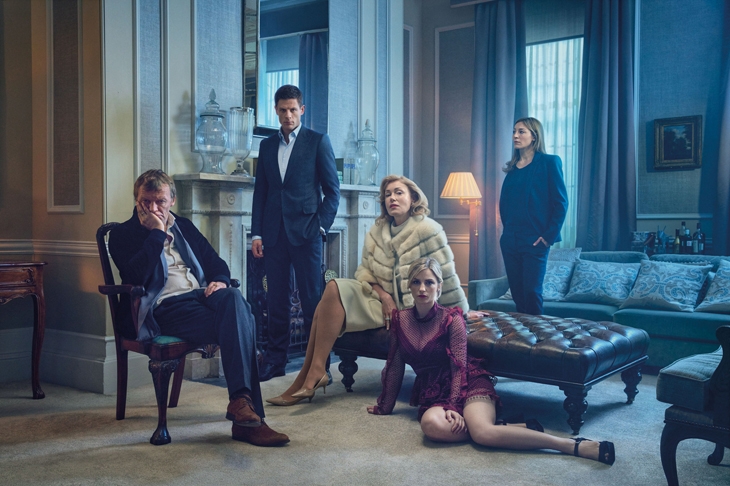My third most fervent New Year wish — just after Litecoin goes to £20,000 and Jacob Rees-Mogg becomes PM — is for the BBC to retire to its study with its service pistol and a bottle of whisky and finally do the decent thing.
After all, as lots of people are beginning to notice, when you spend 40 per cent of your viewing time watching your £79-a-year Amazon Prime, and another 40 per cent on £96-a-year Netflix, your compulsory £145.50 licence fee starts to look like a lot of money to pay for the remaining 20 per cent’s worth of diversity outreach, anti-Brexit whining and green propaganda.
That’s why I was so very disappointed by the BBC’s first big New Year offering. McMafia (Tuesdays) is so brilliant that it almost disproves my point. It’s at least as well acted, suspenseful and sexy to look at as The Night Manager was. So far, it doesn’t look remotely PC. And, unlike its similarly classy, high-budget predecessor, it has the massive bonus of not being burdened by John le Carré’s weird, cartoonish, out-of-date geopolitics.
Instead, it’s loosely adapted from a non-fiction work about the international drugs trade by investigative journalist Misha Glenny. Screenwriters Hossein Amini and James Watkins (who also directs) have used this to lend verisimilitude to a thrilling drama about a handsome, anglicised, public school-educated Russian unable to escape his family’s shady oligarch past.
As in all the best adventure yarns — from Lord of the Rings to The Thirty-Nine Steps to Star Wars — our hero, Alex Godman (a perfectly cast James Norton), is an ordinary-ish chap forced by extreme, unexpected circumstances to do extraordinary things. By inclination he is a respectable investment manager who has taken especial care to purge his past by putting together a fund untainted by anything Russian or otherwise dodgy. But by birthright — not unlike Michael Corleone in The Godfather — he is a ruthless, scheming master criminal. At least, let’s hope he is: otherwise, no way is he going to survive the next seven episodes.
What really impresses me so far about the series, after one episode, is its assurance, its restraint and its air of authenticity. Though the bursts of violence, when they come, are shocking, visceral and exciting, though the locations — Croatia, Qatar, Mumbai, Prague, Tel Aviv, Istanbul, Cairo, etc. — are James Bond exotic, and though everyone moves in the kind of circles where liveried waiters serve caviare at soirées modestly held at the Palace of Versailles, it’s nonetheless grounded in carefully observed and fully relatable reality.
There’s a wonderful vignette, for example, where crazy Uncle Boris, in his classic, oligarch-style English country mansion, is lecturing his Filipina maidservant on the correct way to serve him caviare. He’s at once petulant, high-handed, irascible and oddly sympathetic in the way he attempts simultaneously to tell her off and put her at her ease by explaining that he’s not really cross so she mustn’t look so glum.
And there’s another scene where Alex is with his parents in Hyde Park: Dad morosely, drunkenly feeding the ducks, wishing as ever that he could just go home if only Putin would let him; Mum in her very expensive fur coat. ‘He is like a lion without hair,’ observes Mum sadly. ‘Without a mane,’ Alex corrects her. In a movie, these bits would probably have ended up on the cutting-room floor. But in an eight-part series you’ve got space — and Amini and Watkins have sensitively and intelligently made the most of it.
I have a theory that thanks to series such as The Sopranos and Breaking Bad, screen audiences are becoming much more discerning — and as a consequence we’re living through a golden age in which filmmakers are continually being forced to raise their game in order to avoid being left behind. And it’s not pure blockbuster action and special effects we crave now so much as messiness, moral ambiguity and expansiveness: the things that conventional Hollywood drama has, in recent years, invariably left on the cutting-room floor — with consequences it is beginning to rue.
McMafia is very much part of this positive trend and I only wish that the BBC could make dramas like it every month. But even if it had the budgets — which of course it doesn’t — it lacks the courage and the mindset. That’s because, unfortunately, the BBC’s instincts, like Hollywood’s, tend less towards artistic quality these days than they do towards virtue-signalling and social engineering. So a series like McMafia is always going to be the exception, not the rule.







Comments